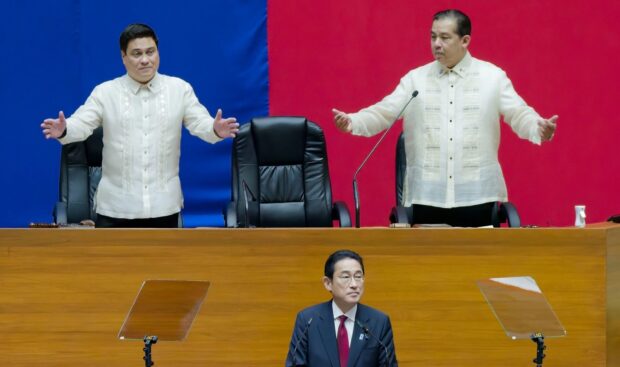Japan-PH relations have reached ‘golden age’ — PM Kishida

Senate President Juan Miguel Zubiri (L) and House Speaker Ferdinand Martin Romualdez (R) with Japan Prime Minister Kishida Fumio at the House of Representatives on November 4, 2023. (C). (Photo from Office of Speaker Ferdinand Martin Romualdez)
MANILA, Philippines — While the current state of Philippine-Japanese ties can be described as being at its ‘golden age’, Japan Prime Minister Kishida Fumio acknowledged the difficult path that the two countries took to reach this stage.
In his speech before Congress on Saturday, Kishida recalled the efforts of their Philippine and Japanese predecessors to promote the relationship of the two countries, admitting that ties were not always “smooth sailing”.
“Looking back over the long history of our bilateral relationship, it has not always been smooth sailing. We cannot forget the endeavor of our predecessors based on the spirit of tolerance, including the pardon of Japanese war criminals by President Quirino in 1953, which paved the way for our two countries to overcome difficult times and build the friendly relationship we enjoy today,” he said.
“Today, Japan-Philippines relationship have reached the point of being called a ‘golden age’,” he added.
Kishida also called the Philippines an irreplaceable partner, with Filipinos having one of the largest populations in Japan, amounting to 300,000.
Article continues after this advertisement“The Philippines, with the second largest population among ASEAN countries and more than 300,000 citizens living in Japan, is an irreplaceable partner for Japan. I am honored to have the opportunity to be the first Japanese Prime Minister to speak here at the Congress of the Philippines, which has a long tradition,” he said.
Article continues after this advertisementREAD: Congress opens special session for Japan PM Kishida’s visit
The Japanese leader then recalled efforts during the time of incumbent President Ferdinand Marcos Jr.’s father, former president Ferdinand Marcos Sr., and former prime minister Fukuda Takeo to build a “heart-to-heart relationship” with Southeast Asia, especially the Philippines.
“In 1977, former Prime Minister Fukuda Takeo delivered a speech in Manila in the presence of President Ferdinand Edralin Marcos, Sr. I am reminded that in that speech, he expressed his desire to build a heart-to-heart relationship of trust with Southeast Asia including the Philippines, as equal partners,” Kishida said.
“About a half century has passed since then. Exchanges between our two countries have deepened, and today, the relationship between Japan and the Philippines is stronger than ever,” he added.
Kishida did not mention any situation in particular that made Philippine-Japanese ties rough, but Japan occupied the Philippines for around three years during the Second World War, attacking Manila as it is a colony of the United States back then.
During the said period, several Japanese soldiers sexually abused Filipino women. Up to date, some of the relatives of the abused Filipinas still call for justice, with no less than the Philippine Commission on Human Rights asking the government to seek an apology from Japan.
READ: CHR, Senate seek reparations from Japan for comfort women
Last March 2023, the United Nations Committee on the Elimination of Discrimination against Women (CEDAW) said that the past Philippine governments also failed to address the concerns of abused Filipino women, colloquially called ‘comfort women’, with regards to restitution, compensation, and rehabilitation.
READ: PH failed to aid World War II ‘comfort women’ – UN body
The House and the Senate held a special joint session at the Batasan Complex on Saturday to welcome and hear the address of Kishida, who is in the Philippines for a two-day visit.
Currently, both chambers of Congress are on a break as session adjourned last September 30. The regular session will officially resume on Monday, November 6.
READ: House to hold special session for ‘important event’ on Nov. 4
The session was presided by Senate President Juan Miguel Zubiri and House Speaker Ferdinand Martin Romualdez. Meanwhile, Kishida’s address would mark the fifth time that the Philippine legislature will accord an honor to a visiting foreign leader.